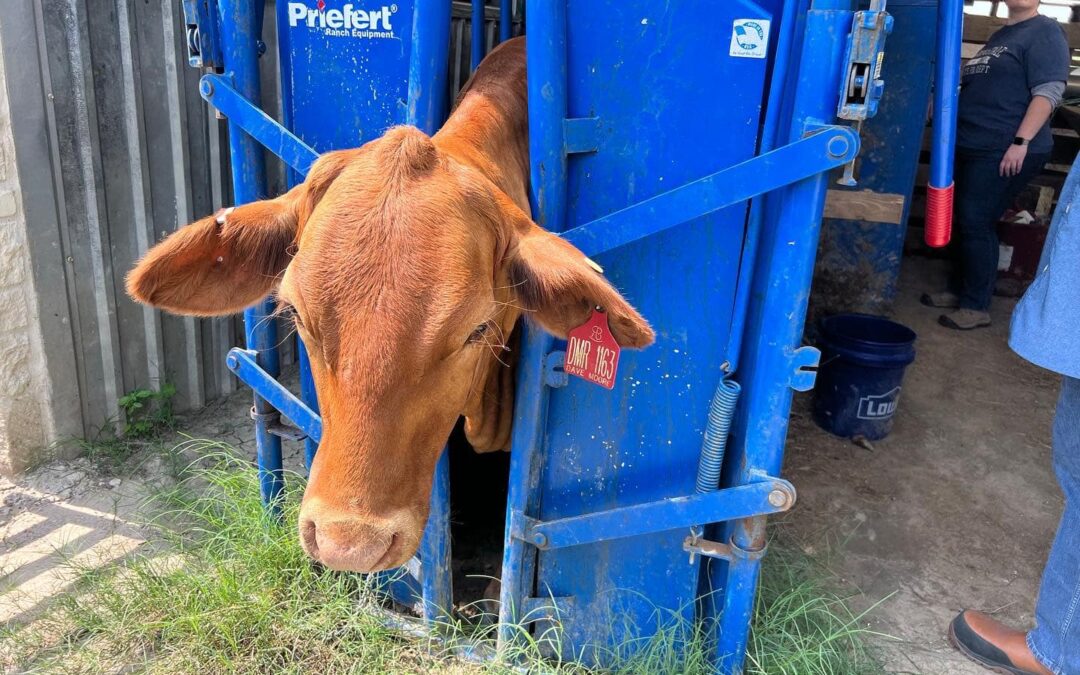Cattle health management is paramount to the success of any ranching operation. While Beefmasters are known for their hardiness and adaptability, like all cattle, they can be susceptible to certain health issues. In this article, we will address common Beefmaster health issues that can affect Beefmaster cattle and discuss preventative measures.
Bloat
Bloat is a common digestive disorder in cattle that results from the build-up of gas in the rumen. This condition can become fatal if the gas is not expelled.
Prevention: Provide a balanced diet to support proper rumen function. Be cautious when grazing cattle on high-risk pastures, such as those rich in legumes, and consider using bloat preventative additives in high-risk situations.
Pneumonia
Pneumonia in cattle is usually a result of bacterial or viral infection and is often associated with stressful conditions. Symptoms include coughing, nasal discharge, fever, and difficulty breathing.
Prevention: Ensure adequate ventilation in housing areas, avoid overcrowding, and minimize stress. Regular vaccination against common respiratory pathogens can also help to prevent pneumonia.
Parasitic Infections
Internal parasites such as roundworms, liver flukes, and lungworms, as well as external parasites like ticks and lice, can cause significant health issues and productivity losses.
Prevention: Regular deworming and external parasite control measures should be part of your herd health management. Pasture rotation and avoiding overgrazing can also help control parasite burdens.
Foot Rot
Foot rot is a painful, infectious condition that can cause lameness in cattle. It’s typically caused by bacteria that enter the foot through a wound or puncture.
Prevention: Regular foot checks, prompt treatment of any foot injuries, and maintaining clean, dry environments can help prevent foot rot. Providing well-drained pasture areas and avoiding areas with sharp stones or debris can also be beneficial.
Mastitis
Mastitis, an inflammation of the mammary gland, often results from bacterial infection. It can cause reduced milk production, weight loss, and, in severe cases, systemic illness.
Prevention: Good hygiene during milking, regular udder checks, and promptly treating any detected infections can help prevent mastitis. Culling cows with recurrent mastitis can also be an effective preventative measure.
Reproductive Issues
Infertility, abortion, and calving difficulties can all impact the productivity and profitability of a cattle operation.
Prevention: Regular vet checks, good nutrition, and selecting for traits related to calving ease and fertility can help prevent these issues. Genetic testing can also be beneficial in identifying potential hereditary reproductive problems.
Nutrition-Related Disorders
Conditions like acidosis and grass tetany can occur as a result of nutritional imbalances or changes in diet.
Prevention: Providing a balanced diet appropriate for the age, sex, and physiological state of the cattle is essential. Be mindful of potential risks when making changes to the diet and consider working with a cattle nutritionist to develop a suitable feeding program.
Conclusion
While Beefmaster cattle are known for their resilience, they’re not immune to health issues. The key to maintaining a healthy herd lies in proactive health management. Regular vet checks, a robust vaccination and parasite control program, good nutrition, and minimizing stress all contribute to the overall health of your Beefmaster cattle. As cattlemen, our primary role is to ensure our herd’s health and welfare, and in doing so, we safeguard the productivity and profitability of our operations.
